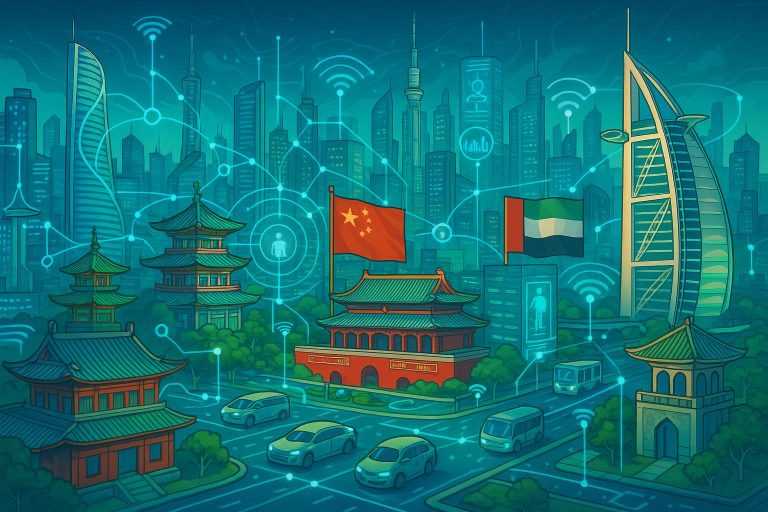The New Digital Silk Road: How China and the UAE are Building a Future in AI
Introduction
In an increasingly interconnected yet complex global landscape, the traditional arteries of commerce and cultural exchange are being redefined by digital currents. The Belt and Road Initiative (BRI), China’s ambitious infrastructure and investment project, is undergoing a profound transformation, evolving into what is now recognized as the Digital Silk Road. This evolution signifies a strategic pivot towards technological collaboration, with artificial intelligence (AI) emerging as a cornerstone of future partnerships. At the heart of this burgeoning digital nexus lies a compelling alignment between China and the United Arab Emirates (UAE), two nations with distinct yet complementary visions for the digital era.
The strategic convergence of China and the UAE in the realm of AI is not merely coincidental; it is a deliberate and mutually beneficial endeavor, rooted in a shared understanding of AI’s transformative potential. China, having rapidly ascended as a global AI powerhouse, seeks international collaborations to further its technological ambitions, extend its digital footprint, and foster a global community of shared future in technology. The UAE, with its audacious vision to transcend its hydrocarbon-dependent economy, views AI as an indispensable catalyst for economic diversification and a cornerstone for establishing itself as a leading global technology hub. This confluence of interests has paved the way for a partnership that is both pragmatic and forward-looking, aiming to harness the power of AI for sustainable development and global influence.
The Digital Silk Road, a modern iteration of ancient trade routes, is characterized by its focus on digital infrastructure, e-commerce, smart cities, and, crucially, artificial intelligence. For China, it represents a mechanism to share its technological advancements and foster deeper economic and political ties across Eurasia and Africa. For the UAE, participation in this initiative offers access to cutting-edge technologies, investment, and expertise that are vital for its national development strategies. This report delves into the intricate dynamics of this partnership, exploring how their shared aspirations are forging a new digital frontier, replete with opportunities and strategic implications for the global technological order. It will examine the motivations, key areas of cooperation, and the broader impact of this burgeoning alliance, all while maintaining a positive and analytical tone characteristic of The Economist.
The UAE’s Digital Transformation
The United Arab Emirates has long harbored ambitions beyond its vast oil reserves, envisioning a future where innovation and knowledge drive its prosperity. This vision has propelled the nation into an aggressive digital transformation, aiming to solidify its position as a global technology hub. This strategic pivot is not merely aspirational; it is backed by substantial investments and a clear policy framework designed to integrate cutting-edge technologies into every facet of national life. At the core of this ambitious agenda is the strategic integration of artificial intelligence, recognized as a pivotal force in the UAE’s economic diversification strategy.
The UAE’s commitment to AI is encapsulated in its UAE AI Strategy 2031, a comprehensive roadmap designed to achieve the UAE Centennial 2071 objectives. This strategy aims to position the UAE as a global leader in AI investments across various sectors, fostering a new vital market with significant economic value. The strategic objectives include boosting government performance through integrated smart digital systems, enhancing productivity across key industries, and creating a future-ready workforce [1]. The government’s foresight in recognizing AI as a cornerstone of future economic growth has led to a concerted effort to build a supportive ecosystem for AI innovation and adoption.
Key sectors targeted for AI integration under this strategy are diverse and far-reaching, encompassing transport, health, space, renewable energy, water, technology, education, environment, and traffic. For instance, AI is expected to revolutionize urban mobility by reducing accidents and cutting operational costs in transport. In healthcare, AI promises to minimize chronic and dangerous diseases through advanced diagnostics and personalized treatments. The space sector benefits from AI through accurate experiments and reduced costly mistakes, while renewable energy facilities leverage AI for optimized management. Water resource analysis, increased productivity in technology, enhanced educational outcomes, increased forestation rates, and effective traffic management are all areas where AI is poised to make a transformative impact [1].
The implementation framework for this strategy is robust, involving the formation of the UAE AI Council, extensive workshops, programs, and initiatives for government bodies. A significant focus is placed on capability development and training for technology staff, ensuring a skilled workforce capable of driving AI innovation. Furthermore, the strategy mandates full AI integration into medical and security services and emphasizes a leadership strategy and government law for the safe and ethical use of AI, reflecting a holistic approach to technological advancement [1].
Beyond policy, the UAE has invested heavily in foundational institutions that serve as beacons of AI research and development. The Mohamed bin Zayed University of Artificial Intelligence (MBZUAI), established in 2019, stands as the world’s first graduate-level research AI university. Its global cooperation model, including Chinese involvement through board members like Andrew Chi-Chi Yao of Tsinghua University and advisory board members such as Dr. Wan Limin, Alibaba Chief Machine Intelligence Scientist, underscores the UAE’s open approach to international collaboration in AI research and development [2]. This institution is pivotal in nurturing local talent and attracting global expertise, further cementing the UAE’s position as a hub for AI innovation.
This proactive stance, coupled with significant investments and a clear strategic direction, positions the UAE not just as a consumer of AI technologies but as a significant contributor and innovator in the global AI landscape. The nation’s drive to diversify its economy away from oil is intrinsically linked to its success in harnessing AI, making its digital transformation a critical component of its long-term national development. The UAE’s commitment to creating a vibrant AI ecosystem, attracting global talent, and fostering innovation is a testament to its vision of a sustainable, knowledge-based economy.
China’s AI Ascent
China’s trajectory in artificial intelligence has been nothing short of meteoric, transforming the nation into a formidable global AI powerhouse. This rapid ascent is not a product of chance but a deliberate outcome of a comprehensive national strategy, characterized by massive government investment, a vast and rapidly expanding talent pool, and a dynamic ecosystem of technology companies. From fundamental research to commercial application, China has rapidly closed the gap with traditional leaders in AI and, in several key domains, has established a leading position. This technological prowess is deeply intertwined with China’s broader geopolitical and economic ambitions, making its international AI collaborations a critical component of its global strategy to foster innovation and extend its digital influence.
The motivations behind China’s proactive engagement in international AI partnerships are multifaceted and strategically aligned. Firstly, these collaborations serve as crucial conduits for accelerating technological advancement. By fostering knowledge exchange, facilitating joint research initiatives, and co-developing solutions, China can tap into global expertise and contribute to the collective advancement of AI, particularly in cutting-edge areas such as machine learning, natural language processing, and computer vision. This collaborative approach enhances China’s own innovation capabilities and ensures its continued leadership in the global AI race.
Secondly, international partnerships are instrumental in facilitating market expansion for Chinese AI companies. As these firms mature and develop world-class solutions, deploying them in new territories becomes essential for sustained growth and global competitiveness. Collaborations, such as those with the UAE, provide avenues for Chinese AI enterprises to showcase their technologies, establish new revenue streams, and build international brand recognition. This expansion not only strengthens their financial standing but also extends China’s digital footprint, contributing to a more interconnected global digital economy.
Thirdly, and perhaps most profoundly, international AI cooperation aligns with China’s overarching vision of building a community of shared future for mankind. This philosophical framework posits that technological progress, particularly in transformative fields like AI, should be shared to contribute to global development and address common challenges. In this context, the Digital Silk Road emerges as a primary vehicle for realizing this vision, with AI acting as a key enabler for digital infrastructure, smart city solutions, and enhanced connectivity across participating nations. This approach emphasizes mutual benefit and shared growth, fostering deeper economic and political ties.
Chinese technology giants, often beneficiaries of significant state backing and private investment, have been at the forefront of this global outreach. Companies like UBTECH Robotics, a leader in humanoid robotics, have secured substantial agreements, such as the $362.4 million deal to bolster AI laboratories in the UAE, backed by Tencent. SenseTime Group, a global leader in AI software, established its EMEA R&D headquarters in Abu Dhabi, a strategic move supported by Alibaba. Huawei, a telecommunications behemoth, has collaborated with Dubai on smart city solutions, while Hikvision has contributed to the UAE’s security infrastructure with its surveillance technology. Furthermore, Alibaba Cloud has established a significant cloud data center in the UAE, providing essential digital infrastructure for the region’s burgeoning digital economy [2]. These examples underscore China’s commitment to exporting its AI capabilities and collaborating on digital transformation initiatives, demonstrating a tangible impact on partner nations.
Moreover, China’s engagement in AI cooperation is also driven by a pragmatic understanding of mutual complementarity. For partners like the UAE, who may face restrictions in accessing Western AI technology due to geopolitical considerations, China often emerges as an indispensable alternative. This dynamic allows the UAE to access advanced solutions and financial support necessary for its ambitious AI agenda. This creates a symbiotic relationship where China gains new markets and influence, while partner nations acquire the necessary technology and investment to realize their own digital ambitions. The strategic importance of China’s role in technology transfer, infrastructure development, investment, and joint research and development in areas like facial recognition, smart cities, and medical AI cannot be overstated [2]. This mutually reinforcing relationship is a hallmark of the Digital Silk Road, fostering resilience and progress in the face of global uncertainties.
In essence, China’s AI ascent is not an isolated phenomenon but a deliberate and well-orchestrated strategy to leverage its technological leadership for global engagement, economic growth, and the cultivation of strategic alliances. The Digital Silk Road, powered by AI, serves as a primary conduit for these ambitions, creating a network of innovation and cooperation that is reshaping the global technological landscape.
The Partnership’s Pillars
The robust and rapidly expanding cooperation between China and the UAE in artificial intelligence is underpinned by a series of strategic agreements, memoranda of understanding (MOUs), and high-level dialogues. These foundational pillars not only formalize their shared commitment but also provide the framework for tangible projects and collaborations that are shaping the Digital Silk Road. The synergy between top-down governmental directives and bottom-up corporate initiatives creates a comprehensive ecosystem for AI development and deployment.
One significant recent event highlighting this deepening partnership was the China-UAE AI Industry Financial Cooperation Forum, held in Shanghai on July 6, 2024. Hosted by the China-UAE Innovation Center (CIC), this forum served as a crucial platform for fostering financial and industrial collaboration in the AI sector. The event was a testament to the growing economic ties, bringing together investors, policymakers, and technology leaders from both nations. The signing of MOUs between CIC and prominent Chinese technology firms, including Beijing Rongxin Digital Technology Co., Ltd. and Shanghai Fudian Intelligent Technology Co., Ltd., signaled concrete steps towards joint ventures, technological exchange, and the co-creation of AI solutions tailored for regional and global markets [2]. These agreements often involve commitments to shared intellectual property, joint market penetration strategies, and the establishment of local production or R&D facilities in the UAE.
Further cementing this strategic alignment was the state visit of UAE President Sheikh Mohamed bin Zayed Al Nahyan to China from May 29-31, 2024. This high-level diplomatic engagement significantly deepened cooperation across critical sectors, particularly in information technology, artificial intelligence, and the broader digital economy. Such visits are instrumental in setting the strategic direction and political will necessary for sustained collaboration, often resulting in bilateral agreements that streamline investment, facilitate talent mobility, and harmonize regulatory frameworks for emerging technologies. The discussions during these high-level meetings frequently touch upon data governance, ethical AI development, and cybersecurity, ensuring a holistic approach to digital cooperation [2].
Beyond these governmental and institutional frameworks, major corporate partnerships form another vital pillar, driving the practical implementation of AI initiatives. Chinese tech giants have made significant inroads into the UAE market, establishing a strong presence and contributing substantially to the local AI ecosystem:
- UBTECH Robotics, a leading Chinese AI and humanoid robotics company, secured a substantial $362.4 million agreement to bolster AI laboratories in the UAE. This investment, backed by Tencent, underscores the commitment to developing advanced robotics capabilities within the Emirates, fostering innovation in areas such as industrial automation, service robotics, and educational AI [2]. This partnership is expected to create specialized training programs and research opportunities for Emirati youth, building a sustainable local talent pipeline.
- SenseTime Group, a global leader in AI software, established its EMEA (Europe, Middle East, and Africa) R&D headquarters in Abu Dhabi in 2019. This strategic move, supported by the Abu Dhabi Investment Office (ADIO) under the Ghadan 21 Accelerator Programme, aims to foster AI adoption across the region and create hundreds of highly-skilled engineering jobs. SenseTime, backed by Alibaba Group Holding Limited, focuses on developing AI capabilities across diverse industries, including healthcare, remote sensing, smart city management, and education, thereby contributing directly to the UAE’s economic diversification goals [3].
- Huawei, a key player in global telecommunications and smart solutions, has collaborated extensively with Dubai on smart city initiatives. These collaborations involve deploying advanced AI-powered solutions for urban management, intelligent transportation systems, and public safety, contributing to the emirate’s vision of a technologically advanced and sustainable urban environment [2]. Huawei’s expertise in 5G and cloud infrastructure provides a robust backbone for these AI applications.
- Hikvision has been involved in surveillance technology projects, enhancing the UAE’s security infrastructure through AI-powered solutions such as intelligent video analytics, facial recognition, and crowd management systems [2]. While these technologies raise privacy concerns in some Western contexts, their deployment in the UAE is often framed within the context of national security and smart city development.
- Alibaba Cloud has established a cloud data center in the UAE, providing essential digital infrastructure to support the growing demand for cloud services and AI applications in the region. This local presence ensures data residency, reduces latency, and offers scalable computing resources crucial for the development and deployment of complex AI models and applications across various sectors [2].
These agreements and corporate ventures collectively illustrate a deliberate and comprehensive strategy to build a robust AI partnership. Despite external pressures and geopolitical complexities, both nations have consistently demonstrated a commitment to advancing their shared digital future, recognizing the mutual benefits inherent in such deep collaboration [2]. The establishment of joint research initiatives and talent exchange programs further solidifies these pillars, ensuring a continuous flow of innovation and expertise between China and the UAE. This includes initiatives like the $5 billion China-UAE partnership announced in 2025, which specifically targets AI, renewable energy, and infrastructure, fostering joint research and talent exchange programs [4]. The Investopia Beijing Forum in September 2025 further reinforced these economic partnerships in new economy sectors, AI, and green technology, signaling a sustained commitment to this strategic alliance. Additionally, collaborations with global players like Nvidia, which launched a joint AI and robotics lab in Abu Dhabi in September 2025, demonstrate the UAE’s multifaceted approach to AI development, complementing its strong ties with China [5].
Case Study: SenseTime EMEA Headquarters in Abu Dhabi
Among the myriad collaborations between China and the UAE, the establishment of SenseTime Group’s EMEA (Europe, Middle East, and Africa) Headquarters in Abu Dhabi stands out as a quintessential example of a Digital Silk Road project with a significant AI component. This initiative, formalized in 2019, represents a strategic fusion of Chinese technological prowess and the UAE’s ambition to become a regional AI hub. It illustrates the practical application of the Digital Silk Road concept, transforming theoretical cooperation into tangible economic and technological development.
The strategic partnership was cemented with an agreement signed in the presence of Crown Prince Sheikh Mohamed bin Zayed Al Nahyan, underscoring the high-level commitment and political backing for this venture. SenseTime, at the time recognized as the world’s highest-valued and fastest-growing pure-play AI company, chose Abu Dhabi as its first presence in the EMEA region. This decision was not merely opportunistic but a calculated move to leverage the UAE’s strategic location, supportive regulatory environment, and ambitious digital agenda. The UAE offered not only a gateway to the broader Middle East and African markets but also a government genuinely committed to fostering an innovation-driven economy [3].
The core of this case study lies in the multifaceted impact and objectives of SenseTime’s presence. The company committed to establishing an R&D center focused on developing AI capabilities across seven key industries, including healthcare, remote sensing, education, and smart city solutions. This initiative was projected to create hundreds of highly-skilled engineering jobs over five years, directly contributing to the UAE’s human capital development in advanced technologies. This focus on local talent development and knowledge transfer is a critical aspect of the Digital Silk Road, ensuring that partnerships lead to sustainable growth rather than mere technological imports [3]. The R&D center serves as a hub for innovation, attracting top talent and fostering a collaborative environment for cutting-edge AI research.
Crucially, the project received significant backing from the Abu Dhabi Investment Office (ADIO) under its Ghadan 21 Accelerator Programme. This support highlights the UAE government’s proactive role in attracting and fostering foreign direct investment in critical sectors like AI. ADIO’s involvement provided financial incentives, regulatory assistance, and access to local networks, significantly de-risking SenseTime’s entry into a new market. The partnership’s broader aim extends beyond SenseTime’s direct operations; it seeks to promote AI adoption across EMEA governments and industries, positioning Abu Dhabi as a nexus for AI innovation and deployment. This strategic vision aligns perfectly with the UAE’s goal of becoming a global leader in AI and a key player in the digital economy [3].
SenseTime’s background further illuminates the significance of this collaboration. Backed by Alibaba Group Holding Limited, the company boasts an impressive client roster including major Chinese and international firms such as China Mobile, Qualcomm, and Honda. Its operations span across mainland China, Hong Kong, Singapore, and Japan, making its expansion into the UAE a natural extension of its global strategy and a testament to the growing interconnectedness of the Digital Silk Road [3]. The company’s expertise in computer vision, deep learning, and facial recognition technologies provides the UAE with access to advanced capabilities that are crucial for its smart city initiatives and public safety applications.
This case study exemplifies how Chinese AI companies are not just entering the UAE market but are actively participating in its economic diversification and technological advancement. It showcases a model of collaboration that involves significant investment, job creation, technology transfer, and the co-development of AI solutions tailored for regional and global applications, thereby solidifying the UAE’s role as a key node in the new Digital Silk Road. The success of this partnership demonstrates the potential for synergistic growth when two nations with complementary strengths and shared strategic visions collaborate on transformative technologies. It also serves as a blueprint for future collaborations, highlighting the importance of governmental support, strategic investment, and a focus on local capacity building in fostering successful international AI partnerships.
Conclusion
The journey along the New Digital Silk Road, as illuminated by the deepening AI cooperation between China and the UAE, reveals a compelling vision for a future shaped by technological collaboration and mutual strategic interests. This partnership is not merely an extension of traditional economic ties but a sophisticated alignment designed to leverage the strengths of both nations in the rapidly evolving digital landscape. It represents a strategic calculus where both Beijing and Abu Dhabi perceive significant advantages in pooling resources and expertise to accelerate their respective national agendas in the AI domain.
The UAE’s ambitious digital transformation agenda, underpinned by its UAE AI Strategy 2031, positions the nation as a proactive innovator seeking to diversify its economy and establish itself as a global technology hub. Its open embrace of international collaboration, exemplified by institutions like MBZUAI, creates fertile ground for partnerships, attracting global talent and fostering a vibrant research ecosystem. Concurrently, China’s remarkable ascent as an AI powerhouse, driven by strategic national planning, massive investments, and a robust technological ecosystem, finds in the UAE a receptive and strategically important partner for its global AI ambitions and the expansion of the Digital Silk Road [1, 2]. This synergy is built on a foundation of shared developmental goals and a mutual recognition of AI as a critical driver for future prosperity and influence.
The pillars of this partnership—high-level forums, governmental agreements, and significant corporate ventures—demonstrate a concerted effort to build a resilient and mutually beneficial relationship. From UBTECH Robotics’ substantial investments in AI laboratories to SenseTime’s establishment of its EMEA headquarters in Abu Dhabi, and Huawei’s extensive smart city collaborations, Chinese enterprises are actively contributing to the UAE’s technological infrastructure and human capital development. These initiatives are not just commercial transactions; they represent a profound transfer of knowledge, technology, and investment that is vital for the UAE’s long-term growth and its aspiration to become a knowledge-based economy [2, 3]. The continuous flow of innovation and expertise is further solidified by joint research initiatives and talent exchange programs, ensuring that the partnership remains dynamic and forward-looking.
Despite the complexities introduced by geopolitical tensions and external pressures, particularly from the United States regarding technology transfer and investment, the China-UAE AI cooperation has shown remarkable resilience. The strategic importance of China as an indispensable partner for the UAE, especially when access to Western AI technology is constrained, underscores the pragmatic and complementary nature of their relationship. Both nations recognize that their shared aspirations for technological leadership and economic diversification are best served through continued collaboration, navigating external challenges with a focus on mutual benefit and strategic autonomy [2]. The recent $5 billion China-UAE partnership and the Investopia Beijing Forum in 2025 further underscore this enduring commitment, signaling a robust future for their collaboration in AI and other new economy sectors [4, 5].
The long-term vision for the China-UAE Digital Silk Road is one of sustained growth, innovation, and shared prosperity. It envisages a future where joint research initiatives, talent exchange programs, and integrated digital infrastructure projects continue to flourish, creating a robust ecosystem for AI development and deployment. This includes advancements in areas such as smart grids, intelligent transportation, and medical AI, all contributing to a more efficient and technologically advanced society. The implications of this partnership extend beyond bilateral benefits, offering a compelling model for South-South cooperation in advanced technologies and potentially reshaping the global technological order by fostering a more multipolar landscape for AI innovation. As the world grapples with the ethical and societal implications of AI, the China-UAE partnership also presents an opportunity to develop shared norms and standards for responsible AI development and deployment.
In essence, the New Digital Silk Road, paved with artificial intelligence, is a testament to the strategic foresight and adaptive diplomacy of China and the UAE. It is a positive narrative of two nations building a future together, demonstrating how collaboration in cutting-edge technologies can drive economic transformation, foster deeper international ties, and contribute to a more balanced and technologically advanced global future in the 21st century. This partnership, while rooted in pragmatic interests, ultimately aims to create a shared digital destiny that benefits both nations and potentially offers valuable lessons for broader international cooperation in the age of AI.
References
[1] UAE AI Strategy 2031. (n.d.). u.ae. Retrieved September 25, 2025, from https://u.ae/en/about-the-uae/strategies-initiatives-and-awards/strategies-plans-and-visions/government-services-and-digital-transformation/uae-strategy-for-artificial-intelligence
[2] Yuan, S. (2024, August 11). China-UAE Relations in Artificial Intelligence. MEPEI. Retrieved September 25, 2025, from https://mepei.com/china-uae-relations-in-artificial-intelligence/
[3] SenseTime EMEA Headquarters in Abu Dhabi. (2019). SenseTime. Retrieved September 25, 2025, from https://www.sensetime.com/en/news-detail/3911?categoryId=1072
[4] UAE and China Forge $5 Billion Partnership. (n.d.). ProXperts. Retrieved September 25, 2025, from https://proxperts.ae/blog/uae-and-china-forge-5-billion-partnership-to-boost-ai-renewable-energy-and-infrastructure







